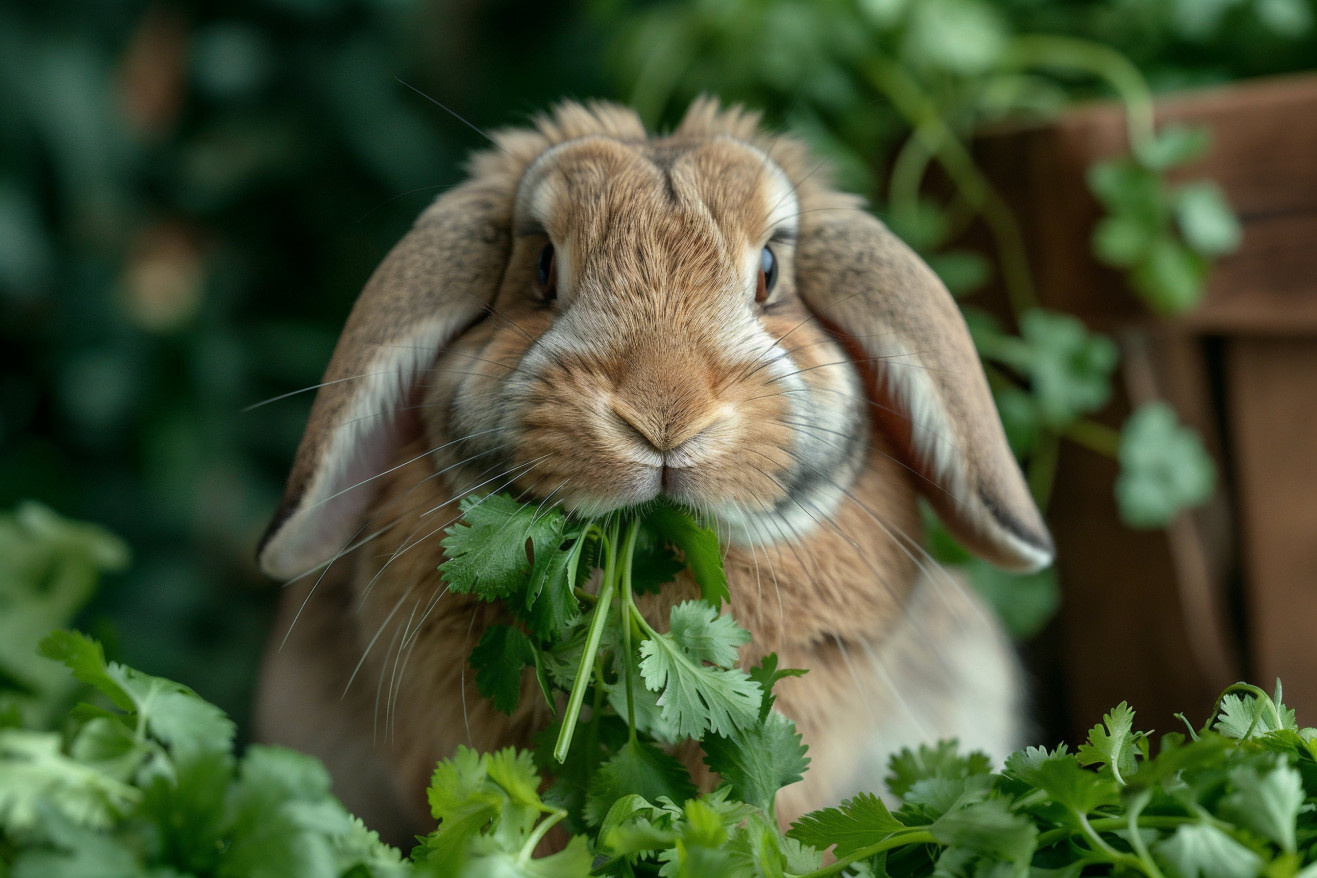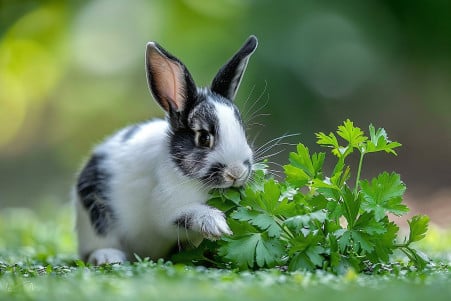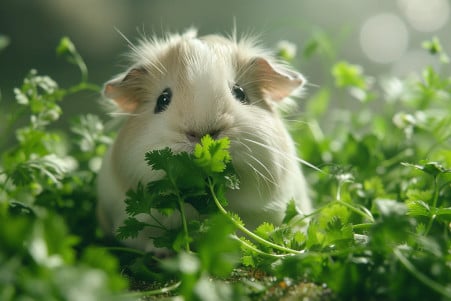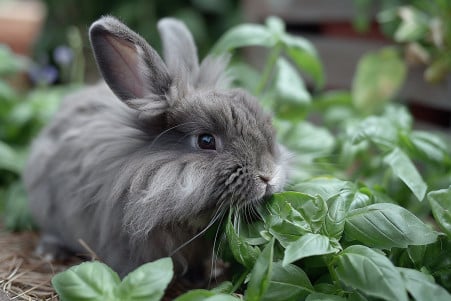Can Rabbits Have Cilantro? Important Things to Know About Rabbit Diets
15 February 2024 • Updated 14 February 2024

Cilantro is a tasty addition to many of our favorite foods, but is it safe for rabbits to eat? The good news is that rabbits can eat cilantro and benefit from the vitamins and antioxidants it provides as part of a healthy diet.
However, cilantro should be introduced slowly and should never make up more than 10% of your rabbit’s diet. Cilantro should also be washed well before being fed to your rabbit, and it should not be given to your pet every day to avoid stomach upset.
This article will take a deeper dive into the nutritional and veterinary research on rabbits and their diets. We will look at research by animal nutritionists and rabbit care recommendations to show why a balanced diet and portion control are important.
By learning about the rabbit digestive system and the nutrients rabbits need to thrive, we can better understand the role that cilantro and other herbs can play in a rabbit’s diet. Our hope is that this information will help you feed your pet rabbit in a way that keeps them healthy.
Can rabbits have cilantro?
The Nutrient Powerhouse: Cilantro in a Rabbit’s Diet
Cilantro is a nutrient-dense herb that can help promote a rabbit’s well-being. In addition to being a good source of vitamins A and C, which are important for eye health and the immune system, according to Rabbit Care Tips, cilantro is also high in vitamin K, which is necessary for blood clotting.
It contains a variety of antioxidants that have been shown to have anti-inflammatory properties. This is especially important for rabbits because antioxidants work to fight free radicals, which can help the body heal from injuries.
That said, it’s important to make sure that rabbits don’t get too much of a good thing. According to Petsolino, cilantro should be given to rabbits as a treat and should make up no more than 10% of their diet.
If rabbits eat too much cilantro, they can experience digestive problems, including gas and diarrhea, especially if they are a smaller breed. In fact, smaller rabbits may only need to eat half a handful of cilantro, while larger rabbits can eat a full handful.
In addition, while cilantro can be a healthy addition to a rabbit’s diet, Cottontail Club recommends that rabbits are monitored closely after they eat cilantro. If rabbits show any signs of digestive upset or behavior changes, they should be taken to the vet right away.
As a result, while cilantro can be a healthy part of a rabbit’s diet, it’s important to make sure that rabbits are also eating a variety of other fresh foods to ensure that they are getting the nutrients they need to stay healthy and happy.
Basic Nutritional Requirements of Rabbits
Creating a healthy diet for rabbits starts with a basic understanding of their nutritional needs. The Merck Veterinary Manual explains that a rabbit’s diet should be high in fiber to ensure proper digestion and to help prevent dental problems caused by their teeth, which never stop growing. Their digestive system, which includes hindgut fermentation, is designed to work best with a diet that’s high in fiber.
Nutritional needs also change as rabbits grow. For example, baby rabbits need more protein to support their growth, while adult rabbits need a diet that’s lower in calories but still high in fiber to help prevent obesity.
According to Protexin Vet, an adult rabbit’s diet should be made up of about 85% hay or grass to ensure they get enough fiber, and they should always have access to fresh water to help with digestion and urinary tract health.
Some of the most common mistakes people make when feeding rabbits include feeding them too many pellets, which Protexin Vet says should only make up about 5% of their diet, and feeding them vegetables that are too high in sugar or other nutrients. A healthy diet for rabbits should include high-quality hay, fresh vegetables, a small number of pellets, and herbs, such as cilantro, to help ensure they get the variety and nutrients they need.
Knowing this, we can now look at the specific ways that herbs can help improve a rabbit’s diet and health.
Herbal Supplements to Add to Your Rabbit’s Diet
Adding herbs to your rabbit’s diet will not only add some excitement, but it will also provide a range of natural nutrients and potential medicinal properties. As the Rabbit Welfare Association & Fund explains, wild rabbits eat a variety of different foods to get the nutrients they need, so it’s likely that domestic rabbits can benefit from a diverse diet that includes herbs like basil, coriander, dill, and parsley.
Cilantro, in particular, is not only aromatic and tasty, but it also contains phytochemicals that can help with digestion and other health issues, according to the Bunny Lady. Meanwhile, dandelion greens and chamomile have their own unique properties. Dandelion greens are an immune system booster, and chamomile can help with digestive problems because it has a calming effect.
As Small Pet Select points out, you should introduce new herbs to your rabbit’s diet slowly and in small amounts to allow time for your rabbit to adjust and to make sure they don’t have any adverse reactions.
Fresh or dried herbs can be sprinkled on hay to make it more nutritious and fun to forage. You should also keep an eye on your rabbit for any changes in behavior or digestion and talk to your vet about how much and how often you should feed your rabbit different herbs.
By making sure your rabbit’s diet includes a variety of herbs, you can make sure they get more out of their food than just hay and pellets, which can help support their overall health and help them with specific health issues.
Weighing the Pros and Cons: Herbs in Rabbit Diets
Knowing the broader health impacts of herbs in a rabbit’s diet is important for the best care. A review from ScienceDirect discusses cilantro and other herbs as possible natural growth promoters and digestive aids. These herbs are shown to have antimicrobial and antioxidant effects, but the review also notes that the results are inconsistent, which means that herbal supplements should be used with caution.
Research from Anim Biosci on PMC shows that natural additives, including herbs, can help rabbits be more productive and have better immune responses when they are dealing with heat stress.
That said, overconsumption of certain herbs can have negative effects. As a result, it’s important to take a balanced approach, as discussed in Agriculture 2023, which says that both plant and animal products can be used as natural growth promoters and immunostimulants.
Rabbit owners should talk to their vets before adding large amounts of herbs to their pets’ diets to make sure that they can be used safely and effectively based on the rabbit’s health and the environment in which it lives.
By using herbs in moderation, rabbit owners can help their pets benefit from herbs while avoiding potential negative effects, which will help them stay healthy in a way that is natural and holistic.
Special Features of the Rabbit’s Digestive System
Rabbits are unique animals with a digestive system that is specialized to meet the needs of their herbivorous diet. One of the most important aspects of their digestive system, hindgut fermentation, enables them to effectively break down a diet that is high in fiber.
As described by Extension.org, rabbits have a relatively short digestive tract that can quickly process large amounts of fibrous plant material, and this is important because rabbits need to eat a lot of fiber to stay healthy. This fast transit time is important because rabbits need to eat a lot of fiber to stay healthy.
Fiber is important for rabbits because it helps keep their digestion moving smoothly and also helps keep their teeth healthy. Since a rabbit’s teeth grow continuously, they need to eat foods that are high in fiber to keep their teeth ground down.
The importance of good-quality fiber is also noted by Purina Animal Nutrition, which says that it’s a major source of energy for rabbits and also helps maintain gut health by promoting the growth of a healthy microbial population in the cecum.
While a diet that includes hay and fresh vegetables like cilantro is good for rabbits, rabbit owners need to be aware of the potential for dietary intolerances and toxicities.
Supreme Petfoods recommends that rabbit owners look for signs of digestive upset, which can include changes in the consistency of the rabbit’s feces, a loss of appetite, or not eating cecotrophs. If any of these signs are present, it’s important to get the rabbit to a veterinarian right away.
In conclusion, the rabbit digestive system is highly specialized, and knowing how it works can help us make sure that our pet rabbits are eating the right things to keep them healthy.
In Conclusion: Rabbits and the Power of Cilantro
In conclusion, cilantro is shown to be a healthy addition to a rabbit’s diet, as long as it is fed in moderation. With its rich supply of vitamins, minerals, and antioxidants, cilantro can help rabbits in a variety of ways, from aiding in digestion to potentially reducing inflammation. However, it should be part of a diet that includes other elements, such as high-quality hay, fresh vegetables, and a limited selection of herbs.
While adult rabbits can be fed cilantro, it’s important to make sure that it is fed in the right quantities—many rabbits will only need about half a handful. Cilantro should be avoided in baby rabbits until they are old enough to eat a variety of solid foods.
It’s also important to watch for signs of potential problems, such as a lack of energy or digestive issues, and to talk to a vet if you have any concerns.
Rabbit owners should also make sure that they are always paying attention to their pets’ overall diet and well-being and staying up to date on the latest research about what rabbits should eat. The bottom line is that cilantro can be part of a rabbit’s diet, but it should be fed in moderation and with the guidance of a professional.


